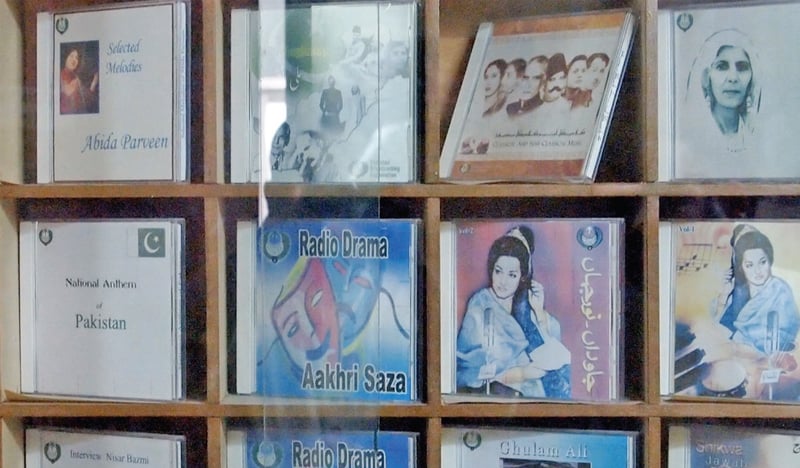The headquarters of Radio Pakistan in G-5 is home to musical instruments used by musical legends of the country and thousands of minutes worth of archives.
The announcement made for the birth of Pakistan at midnight on Aug 14, 1947 also marked the birth of Radio Pakistan. The announcement began with “this is Pakistan Broadcasting Service”.
It was converted into the Pakistan Broadcasting Corporation (PBC) on Dec 20, 1972 as a statutory body governed by a board of directors and the director general. The foundation of the existing headquarters was also laid at this time.
PBC has an extensive national network of AM, FM and SW stations covering 98pc of the population in around 80pc of the total area of Pakistan.
Broadcasts are made from the 20 studios in the headquarters in English, Urdu, local languages and regional languages including Tamil, Gujrati, Farsi, Dari, Bangla, Nepali and Sinhalese. China Radio also transmits its news and current affairs programmes from one of these studios.

Former Pakistan Broadcasting Corporation (PBC) director general Murtaza Solangi said most of the studios in the building had been upgraded with the help of Japan International Cooperation Agency (Jica).
“Currently, we have state-of-the-art modern recording and telecast systems in the radio headquarters,” Mr Solangi said.
However, the most important asset in the Radio Pakistan headquarters is archives of the recorded voices of political, social and entertainment legends of the country, including the first address made by the Quaid-i-Azam.

The hallway on the first floor of the building contains many instruments played by legendary musicians, many of which are not played anymore and are not even known to the younger generation such as the Algoza, Iktara and Veena.
The sound archives are maintained by the Central Production Unit (CPU) in the PBC headquarters. The archives are a total of 741,031 minutes and include memorable songs, speeches, lectures, seminars, musical features, interviews, plays, documentaries etc and are kept on some 26,000 tapes.
It has 82,735 minutes of classical, semi-classical, mystic and folk music including qawali. The CPU was established in 1960 in Karachi as a transcription service to preserve recordings and was later moved to the PBC headquarters in Islamabad.

Radio Pakistan has also launched a project for transferring old voice recordings including radio plays, which were kept on spools and tapes to CDs but the lack of proper equipment has delayed the process.
However, the archive has not yet been made public.
Former information secretary and DG Radio Anwar Mehmood, who initiated the digitisation of records, also suggests the archives should be made available to the public. “The records which should be made public not only include music but also speeches by senior politicians including Fatima Jinnah, former presidents and prime ministers,” he said.

“It is a good idea, to commercially spread the digitised archives of not only old music and radio dramas, but also the speeches and talks of national leaders,” said PBC Director General Shafqat Jalil when asked about initiatives in this regard. “But the decision to float these records is to be made by the government.”
Published in Dawn, October 7th, 2018












































